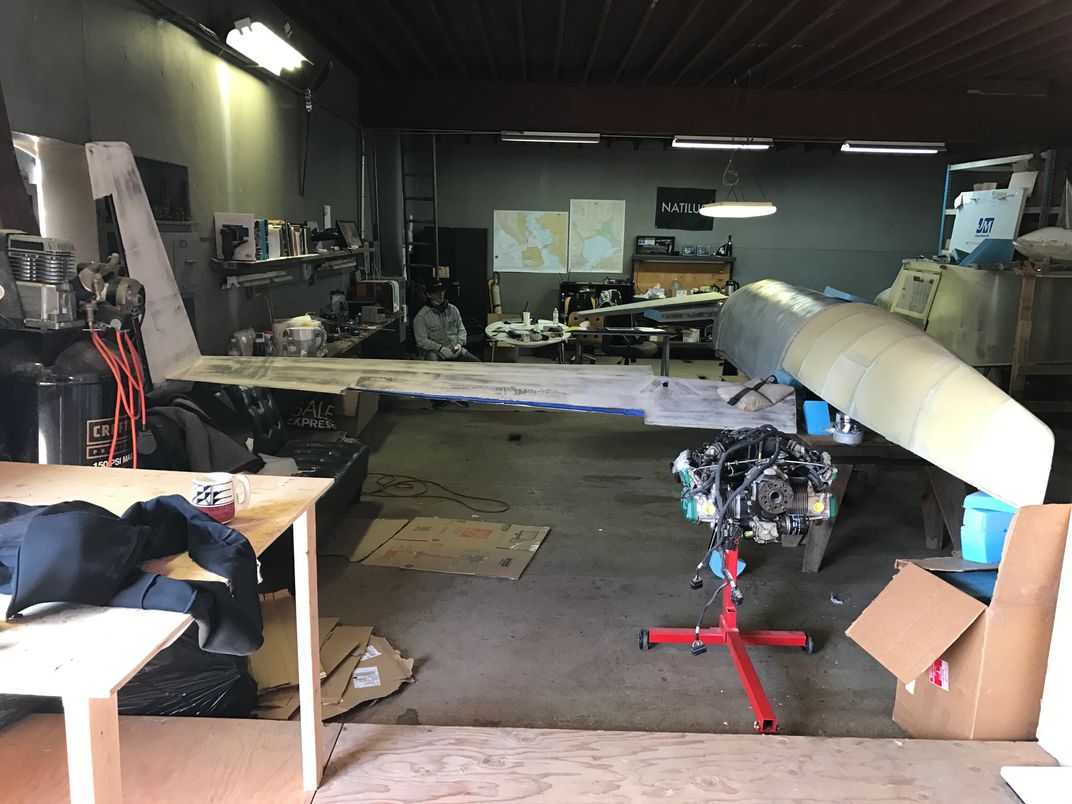Meet Natilus, the Jumbo Drone
A small startup aims to capture some of the huge global shipping business.
/https://tf-cmsv2-smithsonianmag-media.s3.amazonaws.com/filer/64/35/6435b5b0-3490-4857-af05-3d3d66dd85bc/natilus_render.jpg)
A Richmond, California-based startup company recently announced plans to test a prototype delivery drone—hardly a new idea in itself. But Natilus is no small parcel service, like the ones planned by Amazon’s Prime Air and UPS (among others), to carry packages weighing a few pounds over short distances. Natilus drones would be the size of jumbo jets, and would carry hundreds of thousands of pounds of cargo across the Pacific Ocean.
While many drones are designed to basic specifications and only find their purpose later, Natilus is being built for a particular niche market. Today there are only two trans-oceanic shipping methods: Airplanes, which are very fast but very expensive, and ships, which are slow but cost pennies on the dollar by comparison. Natilus thinks it’s found a logistical “sweet spot” that balances speed with volume and weight of cargo with cost; the drones they hope to build could carry up to 200,000 pounds of cargo per flight. The company hopes to carve a lucrative new niche from the cargo markets: Shipping time-sensitive freight that isn’t valuable enough to fly on cargo airplanes, but is more valuable than much of what’s shipped by sea. Vegetables and other consumables, basic electronic components, vehicles, pharmaceuticals and other products could fit the description, leaving ocean shipping for bulkier and cheaper goods like oil or clothing, and leaving today’s cargo airplanes carrying high-value goods like sushi-grade fish or high-end cars. Even a small fraction of the global shipping market could be extremely lucrative for Natilus.
The drones, of course, would not require pilots or crew, and they would launch and land on water, away from controlled airspace, avoiding the need for landing slots at busy airports and compliance with expensive and time-consuming regulations.

The company intends to launch a small prototype drone this summer, backed by $750,000 in venture capital from Silicon Valley’s Draper Funding and with FAA approval already in hand. The prototype is about 70 percent complete, says Aleksey Matyushev, the CEO and one of four co-founders of Natilus.
Although the project is starting with a self-designed, self-engineered prototype, it is much more expensive and technically involved than other DIY drone projects, and has far greater stakes. With a design optimized for efficient flight at a 20,000-foot altitude, the largest production Natilus drone will have a 140-foot wingspan. The prototype, according to Matyushev, has a wingspan of 30 feet and a maximum gross weight of 2,200 pounds, and will cruise at 100 knots airspeed. The prototype will be a seaplane, like the larger production drones, and will lack landing gear. (Matyushev notes that they are “leaving room for landing gear” in their plans.)
Instead of carbon fiber, Natilus is using aircraft grade fiberglass for the prototype, along with plywood and expanding foam, which the designers say will be fine for subscale testing. The prototype will fly with a four-cylinder, 100-horsepower reciprocating engine that drives a propeller. The full-scale drones will use turbofans or turboprops. Matyushev also explained that in piecing the engine, mounts, and all other parts of the prototype together, they are using rapid prototyping techniques: “That allows us to build aircraft components incredibly quickly and inexpensively,” he says. For the all-important flight control computer, they are using an off-the-shelf flight controller for DIY drones customized for larger aircraft.
Will it all work? We’ll find out this summer. “The FAA has been supportive and we have a mutual plan to get us in the air this summer,” Matyushev says. And though Natilus may ultimately not be the company that captues some of the global shipping market, sooner or later someone will.
/https://tf-cmsv2-smithsonianmag-media.s3.amazonaws.com/accounts/headshot/ED_DARACK.jpg)
/https://tf-cmsv2-smithsonianmag-media.s3.amazonaws.com/accounts/headshot/ED_DARACK.jpg)